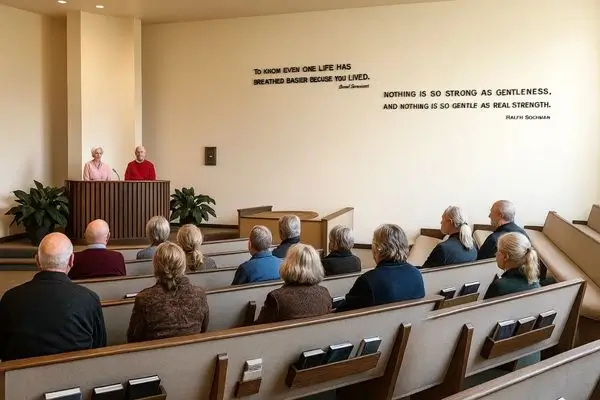A Christian Science Reading Room is a public-access space maintained by the Church of Christ, Scientist. Its purpose is to make Christian Science literature (the Bible, Science and Health, and Health with Key to the Scriptures, as well as periodicals such as The Christian Science Journal, Sentinel, and Herald) available to anyone who wants to read, study, or browse.
Table of Contents
The Reading Room also often functions as a quiet space for reflection, study groups, and prayer. Christian Science is one of those faith traditions that often raises more questions than it answers, especially because its teachings differ significantly from those of mainstream Christian denominations.
In this article, I’ll walk through your list of questions with clarity and nuance.
My goal is to help readers understand what Christian Science is, what it isn’t, and how it relates (or doesn’t) to broader Christianity.
What is a “Christian Science Reading Room” or “Christian Reading Room”?
The term “Christian Reading Room” is less specific (as there are many Christian reading rooms of different denominations). Still, when someone searches for “Christian Science reading room near me,” they typically refer to these denominational Reading Rooms.
To find one near you, you can use the official Christian Science website (they have a “Find a Church / Reading Room” feature) or search locally for “Church of Christ, Scientist – Reading Room” plus your city name.
Do Christian Scientists take communion?
This is one of the more surprising differences. The short answer: not in the traditional way (with bread and wine). Christian Scientists observe two semiannual Communion services (on the second Sunday of January and July) where they engage in silent, spiritual communion with God — kneeling in quiet prayer, reciting the Lord’s Prayer, but without ritual use of bread and wine.
Mary Baker Eddy, the founder, discouraged physical ritual—she believed that the material symbols (bread, wine) distracted from the deeper spiritual communion.
So, while Christian Scientists do “commune,” it’s understood as a spiritual, ongoing communion rather than a symbolic eating and drinking.

Is Christian-Science a Protestant religion?
The classification is tricky. Christian Science emerged within a largely Christian / Protestant cultural context, but it differs significantly from most Protestant confessions. Some key points:
- It does not adhere to traditional Protestant doctrines, including the Trinity, original sin, the nature of Christ, and atonement.
- It considers itself “Christian” — it explicitly embraces Jesus, the Bible, and claims to “reinstate primitive Christianity and its lost element of healing.”
- However, many scholars view Christian Science as a New Religious Movement or a restorationist movement, rather than simply a Protestant denomination.
In short, it has roots in Protestantism and identifies as Christian, but it is doctrinally distinct enough that many would not categorize it as a conventional Protestant church.
Is Christian Science a church?
Yes—but not in the conventional sense. The formal name is Church of Christ, Scientist.
But it operates quite differently from many Christian churches:
- It has no ordained clergy, no sacraments like baptism, and no formal rituals (aside from the Communion service described earlier).
- A board of directors governs its operations, and its Manual of The Mother Church (written by Eddy) establishes its policies.
- It has branch churches and societies around the world, meeting in “churches” or meeting places.
So yes, Christian Science is a church in organizational form, but with a quite different structure and practice compared to many Christian denominations.
How many members are there in the Christian-Science movement?
This is a surprisingly difficult question because the Church does not publish official membership numbers (such reporting is restricted by its internal rules).
Here’s what estimates and historical data suggest:
- The Church sometimes claims a membership of about 400,000 worldwide (though scholars are skeptical).
- Independent estimates (based on the number of churches, practitioners, and decline trends) put actual active members much lower, somewhere between 50,000 and 100,000 or even less.
- Historically, in 1936, the Church reached a peak membership of approximately 270,000 in the U.S.
- As of recent counts, the number of congregations (churches & societies) continues to decline. In 2023, one survey noted around 1,253 churches and societies worldwide (855 churches + 398 societies).
- In the U.S., the number of Christian Science churches decreased from ~1,800 in 1971 to around 900 in 2009.
So the best phrasing is: “The church does not officially report membership, but estimates range wildly; independent observers believe the active membership is far smaller than institutional claims.”

Do Christian Scientists go to doctors?
This is one of the most debated and controversial aspects of Christian Science. Short answer: some do, some don’t—and the tradition’s teachings place great emphasis on prayer healing.
What the doctrine says
Christian Science teaches that disease, sickness, and sin are not ultimately real in the material sense, but are errors in human thinking. Healing comes through prayer, as one aligns their thoughts with divine Truth.
Historically, Mary Baker Eddy discouraged reliance on medicine because she believed it implied accepting the reality of illness.
However, the Church’s stance in recent decades has softened:
- The Church now says that Christian Scientists may choose to receive medical care if they believe it is necessary, emphasizing that the decision is up to the individual’s conscience.
- Some Christian Scientists do, in fact, use doctors and medical treatment (for example, for broken bones, dental care, eye care). The Church does not universally forbid medical intervention.
- That said, some traditionalists believe that mixing Christian Science prayer with medical care weakens spiritual healing, and some practitioners may refuse to continue spiritual treatment if a client uses medicine.
So yes, Christian Scientists can and sometimes do go to doctors—but whether they do is a matter of personal choice, theological conviction, and sometimes tension with more conservative practitioners.
Why might someone leave Christian Science?
People leave (or drift away from) Christian Science for many reasons. Here are some common ones, drawn from personal testimonies, critiques, and scholarly commentary:
Conflict with science and medical realities
Some members find that for serious health issues, prayer alone may not suffice, and medical care becomes necessary—and that tension can prompt leaving.
Emotional or spiritual disillusionment
Some individuals believe that the spiritual promises, particularly those related to healing, did not materialize in their personal experience.
Institutional decline and shrinking community
As churches close and fewer members remain, community and support structures weaken.
Difficult questions about doctrine
Doubts about the nature of God, matter, suffering, death, and how Christian Science aligns with biblical Christianity may push some away.
Social and legal pressures
Stories of children denied medical care or legal cases have generated public scrutiny. Some members may leave under pressure or disapproval.
Desire for a more conventional Christian experience
Some people want sacraments, clergy, liturgy, or a more orthodox Christian framework that Christian Science does not emphasize.
See Also: EVs vs Gas Cars: Conquering Range Anxiety, Easy Charging
In an article titled Why I Left Christian Science,
A former member describes how congregational decline, doctrinal strains, and life events (including illness, family issues, and personal doubts) led to their departure.
Leaving is often a deeply personal and painful transition—people may feel they’re giving up faith, family ties, identity, or hope.
Does Christian-Science follow the Bible?
Yes—Christian Science regards the Bible as a central holy text, in tandem with “Mary Baker Eddy’s book Science and Health with Key to the Scriptures.” Wikipedia+3Wikipedia+3Christian Science+3
However, “following the Bible” means interpreting it through a metaphysical, spiritual lens. Key points:
- Passages about physical illness or spiritual struggle are allegorized or spiritualized.
- Miracles, healings, resurrection, etc., are seen as demonstrations of the spiritual law rather than physical phenomena.
Eddy’s writings are used as a lens to interpret Scripture. Science and Health is considered an authoritatively interpretive companion to the Bible. So yes—they claim biblical fidelity—but much of their doctrine and practice depends on interpreting the Bible in distinctive (often symbolic or spiritual) ways.
Does Christian Science believe in heaven?
Yes—Christian Science teaches that eternal life, heaven, and God’s spiritual realm are the true reality. The material world (including illness, death) is seen as less-than-ultimate or illusory.
In Christian Science theology:
- Death is not annihilation but a transition. The belief is that the “real man” (a spiritual being) is eternal, and the body is merely a temporary appearance.
- Paradise, heaven, and the kingdom of God are taken as spiritual states or eternal realities rather than merely future hopes.
Thus, Christian Scientists do believe in heaven, but their conception is quite spiritualized—and less focused on physical resurrection or future bodily reward than many Christian traditions.
What is Val Kilmer’s religion?
Actor Val Kilmer was a lifelong practitioner of Christian Science.
Some details of note:
- Kilmer openly discussed his Christian Science faith when faced with throat cancer, initially attempting to rely on prayer and spiritual means for healing.
- He described the cancer as a “suggestion” rather than a reality, in line with Christian Science terminology.
- Ultimately, he underwent surgery, chemotherapy, and radiation. He later stated he still believed his spiritual approach contributed to his healing or coping.
- He said he was not afraid of death because, in Christian Science metaphysics, dying doesn’t mean ceasing to exist in the spiritual realm.
So, Val Kilmer’s religious identity was deeply entwined with Christian Science—but his life illustrates some of the tensions that arise from applying these beliefs in real-world medical crises.
Do Christian Scientists celebrate Christmas?
Yes, many Christian Scientists do celebrate Christmas—though perhaps with a different emphasis than other Christians. Their focus is on the spiritual reality of Christ rather than material or ritual trappings.
Mary Baker Eddy herself wrote hymns for Christmas (e.g., “Christmas Morn”) and included them in the Christian Science Hymnal.
In practice:
- The Bible lesson (weekly study) occasionally includes themes around Christ’s birth. Still, Christian Science does not have unique doctrinal doctrines around Christmas (e.g., saint days, liturgical calendars) as many traditional churches do.
- The emphasis tends to be on the deeper spiritual meaning: divine Love, manifestation of Christ, light overcoming darkness, etc.
- Because Christian Science considers “matter” less real, the celebration focuses less on material displays and more on spiritual reflection.
So yes—Christian Scientists typically do observe Christmas, but in a spiritual, less ritualistic way.
Summary & Reflection
Christian Science is a distinctive Christian movement that emphasizes spiritual healing, the primacy of prayer, and a metaphysical understanding of reality.
Because it diverges significantly from mainstream Christian theology (especially regarding illness, the material world, and traditional sacraments), it often prompts confusion and critical questions.
Key takeaways:
- Christian Scientists don’t take communion in the traditional sense; they observe spiritual communion twice a year without bread and wine.
- While rooted in Christian heritage, its theology is distinct enough that it’s better described as a restorationist movement rather than a standard Protestant church.
- It is a church—but one without clergy, sacraments, or typical ritual structures.
- Official membership numbers are undisclosed; estimates suggest the active membership is small and in decline.
- The stance on medical care is nuanced: doctrine emphasizes healing by prayer, but many Christian Scientists do use doctors, and the Church allows that choice.
- Many leave due to tension between doctrinal ideals and life challenges of illness, doctrine, or institutional change.
- Christian Science regards the Bible as central, but interprets it through metaphysical, symbolic lenses.
- It affirms belief in heaven, though understood in spiritual—not strictly physical—terms.
- Val Kilmer was a prominent example of a Christian Scientist publicly grappling with these beliefs in the context of illness.
- Christmas is observed, but more as a spiritual reflection than a ritual celebration.